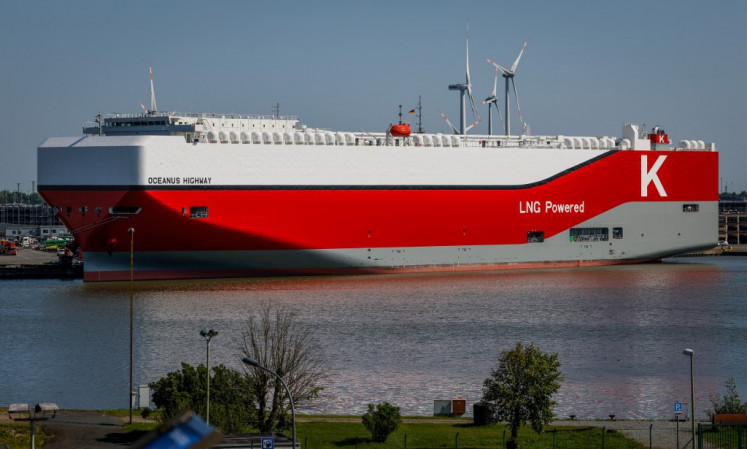Popular Reads
Top Results
Can't find what you're looking for?
View all search resultsPopular Reads
Top Results
Can't find what you're looking for?
View all search resultsWill Japan lead Asia to maintain regional peace?
Growing mistrust, unilateral territorial claims and xenophobic nationalism among leading Asian nations are posing a serious threat to regional peace and security
Change text size
Gift Premium Articles
to Anyone
G
rowing mistrust, unilateral territorial claims and xenophobic nationalism among leading Asian nations are posing a serious threat to regional peace and security. Asia badly needs a new regional security architecture and a new leader to manage tensions and prevent wars.
The escalating tensions are coming at a time when the world's sole superpower, the US, is in retreat, downsizing its role in global affairs and conflicts as reflected in US President Barack Obama's recent key foreign policy speech at the West Point Military Academy and the spectacular rise of China and Russia.
But the question is which Asian country is capable of taking the lead?
One can easily shortlist countries like China, Japan, India and Indonesia for the task.
With its 1.35 billion population and the world's second-largest economy as well as growing military might, China, which is not a hegemonic power, can take the lead and contribute positively to regional peace and security through its soft and hard power. In the past, China assured the world that its rise would be a peaceful one and pose no threat to anybody.
But China's recent unilateral actions in both the South China Sea (SCS) and East China Sea, especially under President Xi Jinping's rule, are pointing at a different direction.
China recently deployed a giant oil rig called Haiyang Shiyou 981 along with a flotilla of vessels, armed ships and fighter planes into an area in the SCS located within Vietnam's exclusive economic zone (EEZ) and continental shelf. The US immediately condemned Chinese actions while China claimed the oil rig was within its "inherent territory".
Earlier in November 2012, China established the controversial Air Defense Identification Zone (ADIZ) in the East China Sea, near the disputed islands of Senkaku (in Japanese) or Diaoyu (in Chinese), raising the ire of Japan.
There was nothing wrong with establishing the ADIZ but China should have informed its neighbors about its reasons and intentions in advance.
China claims 90 percent of 3.5 million square kilometers of SCS waters, based on a controversial nine-dash map that encompasses a portion of Indonesia's Natuna Island. Taiwan, Vietnam, the Philippines, Malaysia and Brunei Darussalam have overlapping claims in the SCS with China. Likewise, the Senkaku islands are being claimed by both China and Japan.
China is reluctant to take the SCS dispute to international arbitration because the SCS, which is rich in hydrocarbon reserves, fishing and is a key international trade route, is its "core interest". In Chinese diplomatic parlance, "core interest" means no room for compromise.
"On issues of territory and sovereignty, China's position is firm and clear: We will not take anything that is not ours, but we will defend every inch of territory," Chinese Foreign Minister Wang Yi said recently.
Such words, which sent new shudders down the spines of China's neighbors and fueled xenophobic, nationalist feelings in Vietnam, Japan and the Philippines, do not reflect the behavior of a responsible global power.
China has transformed the SCS into a "focal point" of maritime disputes in Asia or "Asia's Cauldron" in the words of noted US scholar Robert D. Kaplan, who penned a book with the same name recently.
India and Indonesia, the de facto leaders of South Asia and Southeast Asia respectively, are not in a position to assume regional leadership with their main preoccupations rooted in domestic issues.
Alarmed by China's meteoric rise, Japan, the world's third-largest economy, has come forward to fill the gap. Japanese Prime Minister Shinzo Abe, a right-winger who wanted to change the pacifist Japanese constitution to provide more flesh to Japan's armed forces, unveiled a new concept -- the "New Japanese" -- to assume the leadership of Asia with a main focus on observing international law and establishing regional peace.
"Japan will offer its utmost support for the efforts of the countries of ASEAN as they work to ensure the security of the seas and the skies," said Abe, a shrewd politician who wants to revive Japan's stagnant economy through his "Abenomics" -- a mix of fiscal stimulus, quantitative easing and structural reforms -- at the Shangri-La Dialogue in Singapore.
"Japan for the rule of law. Asia for the rule of law. And the rule of law for all of us. Peace and prosperity in Asia, forever more," he said.
Claimant countries like Vietnam and the Philippines want to solve the SCS issue through peaceful negotiations and based on the 1982 UN Convention on the Law of the Sea (UNCLOS).
To cool tensions, they ask for the full implementation of the 2002 Declaration on the Conduct of Parties (DoC) in the SCS and ASEAN's six-point principles on the SCS and the conclusion of a legally binding code of conduct (CoC) in a timely manner.
Abe's vision is in line with ASEAN's policy to solve all maritime disputes through peaceful negotiations and legal means. It was Indonesia's idea to design a legally binding CoC for all SCS claimant countries to manage tensions.
Only China, apparently, is not in a hurry to sign the CoC. It took more than eight years to discuss and sign the toothless DoC between ASEAN and China in 2002.
Under the banner of a "proactive contribution to peace", Japan is willing to forge economic and security cooperation with ASEAN countries, the US, Australia, India, France, the UK and Germany.
But with its colonial ambitions, Japan brought misery to millions in most Asian countries during World War II. Thus, several countries view Japan's leadership plans in Asia with suspicion.
China slammed Japan's plan to pool all Beijing's rivals and arm them with tacit support, which could lead to more tensions.
The ball is in China's court now to cool down tensions by stopping new provocations and sit together with all parties to discuss the issue. Other SCS claimants must show extreme restraint.
Perhaps the status quo is the best mantra for now. War would devastate Asia and put Asians a century back. Both China and all claimant countries can follow the example of Indonesia and the Philippines, which recently reached an agreement through peaceful but long negotiations on the delimitation of their overlapping EEZs.
The author is a staff writer at The Jakarta Post.










